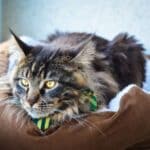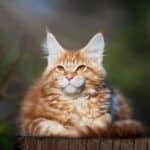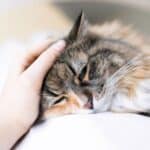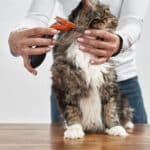If you're looking for maine coon kittens for sale you should also be informed about their health and problems.
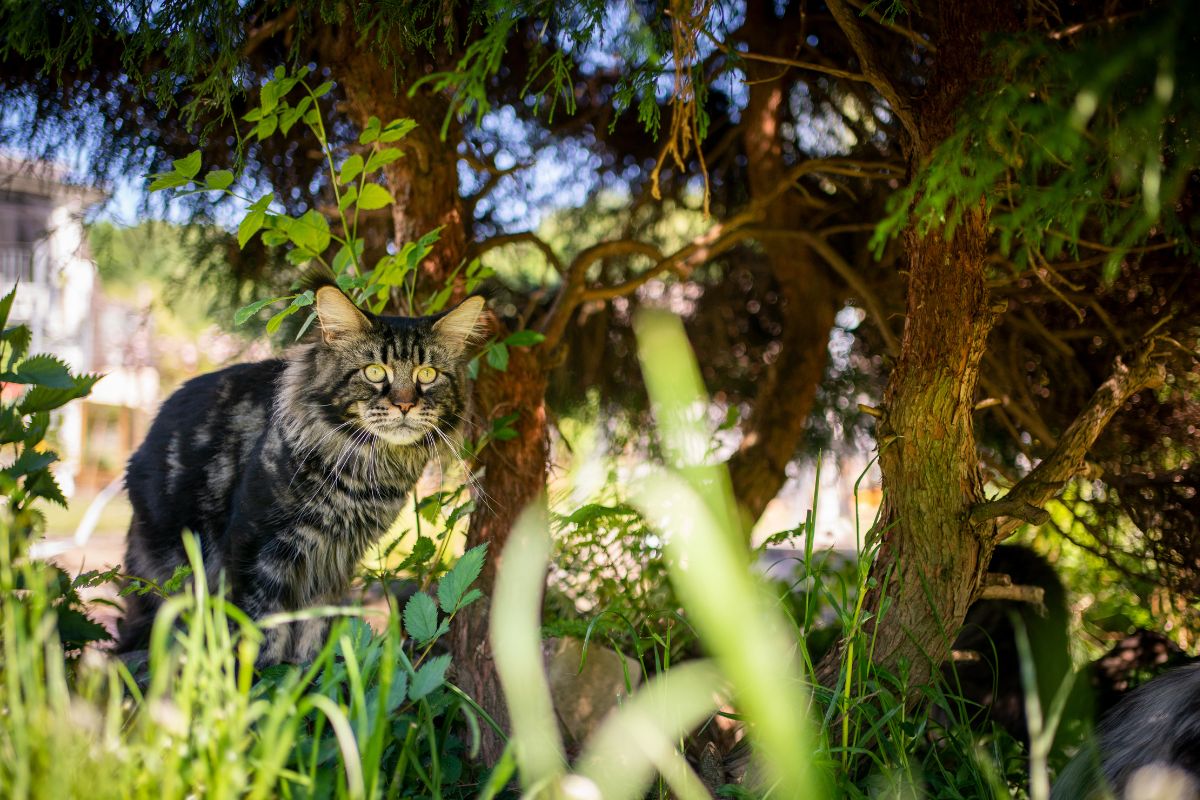
The maine coon cat is a large and handsome animal, being the largest domesticated cat breed officially recognized.
With fantastic looks, an intelligent and inquisitive nature and generally great health, often living between 10 to 15 years, it is easy to see why they are a popular pet. However, the Maine Coon does two significant hereditary issues.
The first is hip dysplasia, but more significantly, there are significant risks that your Maine Coon could develop heart problems.
Like a human, a cat's heart is hollow and made of muscle. It is located in the center of the chest and has 4 chambers that work together to pump blood around the body. And just like us, they carry the risk of genetic or acquired heart disease.
All cats carry a potential risk of suffering from heart disease. Sometimes, the signs are obvious. Other times the indications of a serious heart problem can be hidden for years, presenting itself suddenly with a serious deterioration of health and ability, or even perhaps death.
Jump to:
Congenital Defects
Congenital heart disease in cats means that the condition is present at the time of birth and can be inherited from its parents and passed on to future offspring. The most common form of heart disease in cats is hypertrophic cardiomyopathy.
Unusual thickening of the heart walls in affected cats leads to multiple problems and prevents normal heart function, leading to heart failure. Sadly, it was discovered in 2005 that a genetic mutation in a protein gene code was the cause of the Maine Coon heart problems. Studies show that up to 34% of Maine Coon cats carry this genetic abnormality related to hypertrophic cardiomyopathy.
Most cats with hypertrophic cardiomyopathy do not suffer from heart failure and therefore have no secondary health issues.
However, Maine Coons, with their higher prevalence for hypertrophic cardiomyopathy means that they are amongst the most frequent sufferers of heart disease, relative to their population size.
In hypertrophic cardiomyopathy the heart muscle cells to not work properly because of the genetic faulty. The unaffected muscle cells therefore have to work harder to make up for this failure and over time they become enlarged. This enlargement is the process by which the heart walls thicken.
As heart failure progresses, the heart fails to adequately pump blood around the body, leading to blood clots, fluid build-up in the chest and lungs, causing breathing problems and eventually to death.
A genetic test is available to help Maine Coon owners and potential buyers Maine Coons can test negative but may still develop hypertrophic cardiomyopathy. This will potentially be due to other, currently unknown, genetic faults.
While Maine Coons are generally healthy, inherited genetic heart disease can shorten life, cause pain or decrease mobility. Responsible breeders have their cats tested and share the result, and buyers should look for breeders who can confirm the results of such tests.
Acquired Disorders
In addition to the risk of congenital defects, there is also the risk of your Maine Coon acquiring heart disorders.
These occur in middle aged to older animals. Sometimes this is simply a result of ‘wear and tear’ on the heart, but it can result from a variety of illnesses, such as feline myocarditis, an inflammation of the heart muscles, tissue death in the heart that results in blood clots and other types of cardiomyopathies.
In addition, the Maine Coon breed is prone to becoming overweight, which carries its own risks, such as diabetes, high blood pressure, kidney disease, cancer and of course, heart disease.
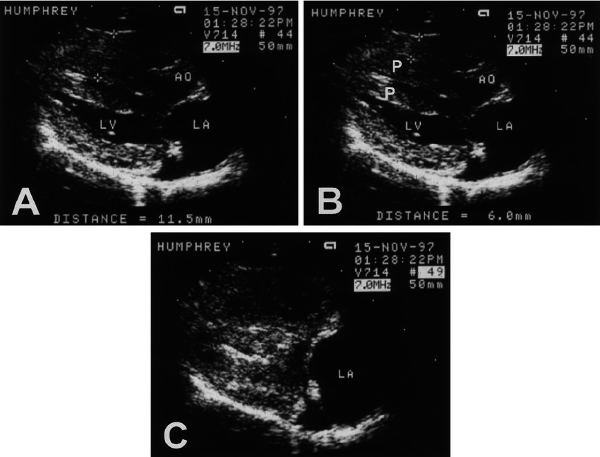
Early signs of heart disease
In the initial phase of the condition, cats may show no signs in all and also appear entirely normal. In fact, a number of cats with cardiomyopathy may never ever actually develop clinical disease, but for those that do, the development of the underlying illness can be slow-moving for some cats, whilst for in others it can be quite rapid.
Some very early signs of heart disease might be observable during an exam by your veterinarian, prior to the beginning of any type of obvious indications. This is one of the reasons every cat ought to be examined annually by a vet (and also preferably more regularly in older cats). Early cautioning indications that your veterinarian might spot include:
- Heart murmurs. This is an abnormal noise your vet can identify when listening to your cat’s heart with a stethoscope. It develops due to turbulence of the blood flowing through the heart.
- A gallop rhythm. Throughout each cycle of heart contractions, usually it is possible to hear two sounds, which are associated with the opening and closing of the valves in the heart. With significant heart problems, a third audible noise in the heard can sometimes be heard.
- Heart rhythm disturbances. Also commonly called cardiac dysrhythmias. Healthy cats have a really regular heart rate, but with heart disease there can be interference in the normal electrical impulses that regulate heart contractions
- Abnormalities in heart rate. Heart disease can cause the heart rate to often significantly increase or reduce outside of the normal range for a cat, and also occasionally there might be heart beats without an effective flow of blood. This results in a no observable pulse for that beat, referred to as a pulse.
Many cats in the early stages of heart disease may only have changes in the heart muscles that can be detected during ultrasound examination of the heart. Whilst not showing symptoms in these early stages, these cats are clinically silent (or asymptomatic but many will go on to develop signs later on.
Stages Of Heart Disease
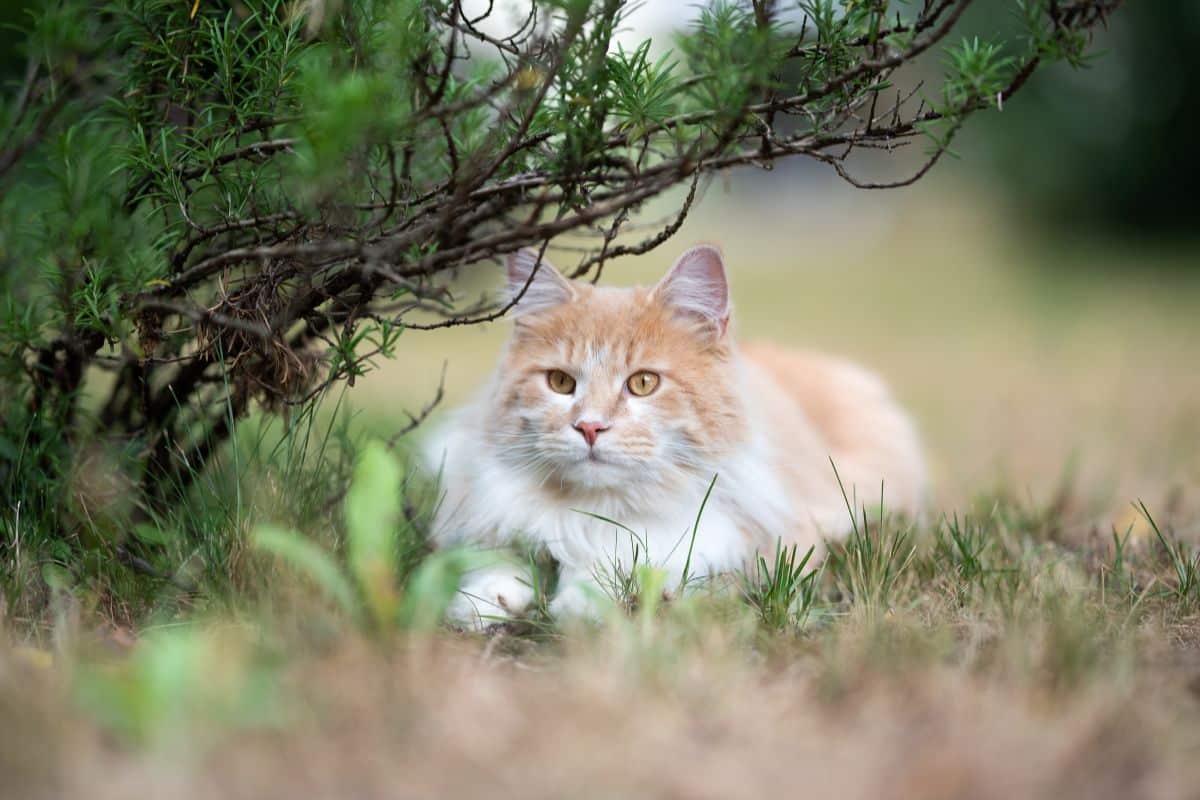
There are several stages of heart disease and congestive heart failure in cats that vets use to determine severity:
- Asymptomatic: Heart disease has been detected, but there is a lack of any outward sign. Additionally, a heart murmur or arrhythmia may also be present.
- Mild to moderate heart failure: Significant clinical signs of congestive heart failure are in evidence both at rest and while active.
- Advanced heart failure: Critical clinical signs are evident, including respiratory distress, fluid in the body cavity (ascites), and profound exercise avoidance. The prognosis will worsen with each passing stage.
The symptoms of hypertrophic cardiomyopathy are varied, depending on the degree of severity. Most frequently, patients are diagnosed when they have no symptoms but after a veterinarian detects an irregular heart beat or a heart murmur during an examination.
When symptoms are detected, they can include sudden loss of movement in one or more legs due to blood clots; signs of congestive heart failure, including rapid or labored breathing, loss of appetite and general lethargy, and changes in daily behavior such as hiding or seclusion); problems remaining standing, stroke or death. On occasion, sudden death may occur without any symptoms being noted.
Heart Failure
If heart function is dramatically damaged by cardiomyopathy, this will bring about cardiac arrest (frequently called congestive heart failure), where there is compromised flow to blood circulation via the heart and also blood outflow from the heart.
Cats can sometimes show medical indicators without previous warning signs, with some declining very rapidly. Some pet cats with heart disease program signs of collapse, or 'fainting'.
This is fairly unusual and usually connected with significant disruptions to the normal rhythm of the heart (which can lead to episodes where the mind is starved of oxygen through inadequate blood flow).
Because cats are not typically 'exercised', such as being taken for walks on a lead like dogs, it is often a lot more challenging to observe that they are experiencing a lowered workout capacity, a frequent early indicator of heart disease.
Spotting early signs of heart disease is often especially tough as cats are great at hiding signs of disease.
Diagnosing Hypertrophic Cardiomyopathy
Detecting hypertrophic cardiomyopathy in cats starts with one of one of the most reliable analysis tools for finding cardiovascular disease in cats: A Heart Exam. A heart exam (also termed a Cardiac Exam) permits vets to follow a thorough investigatory protocol to identify the presence and degree of hypertrophic cardiomyopathy in cats. A cardiac exam can include some or all of the procedures below:
- Physical exam: Your vet will listen to your cat's heart and lungs with a stethoscope to check for abnormal sounds.
- Blood pressure: A standard, non-invasive blood pressure test is performed to monitor systolic and diastolic pressure.
- Blood analysis: Blood tests allow for a complete blood work chemistry, allowing your vet to assess the overall health of your cat. A blood chemistry analysis can also determine the level of thyroid hormone present in the bloodstream. This is very helpful when evaluating hypertrophic cardiomyopathy in cats, because an overactive thyroid gland can be another underlying cause of heart disease.
- Electrocardiogram (EKG): Measuring the electrical activity of your cat's heart can help to diagnose heart murmur in cats, as well as other conditions.
- X-Rays: An Xray allows your vet to view the heart's overall size, its positioning in the chest, and the health of the lungs.
- Ultrasound: Measurements via ultrasound of your cat's heart's chamber, valves and muscles, as well as the major cardiac vessels using soundwaves.
Given that heart disease, both congenital and acquired, is common in cats and especially so for the larger Maine Coon breed, it is advisable to know what treatments are available for your pet if the worst should be confirmed by these tests.
Treatment
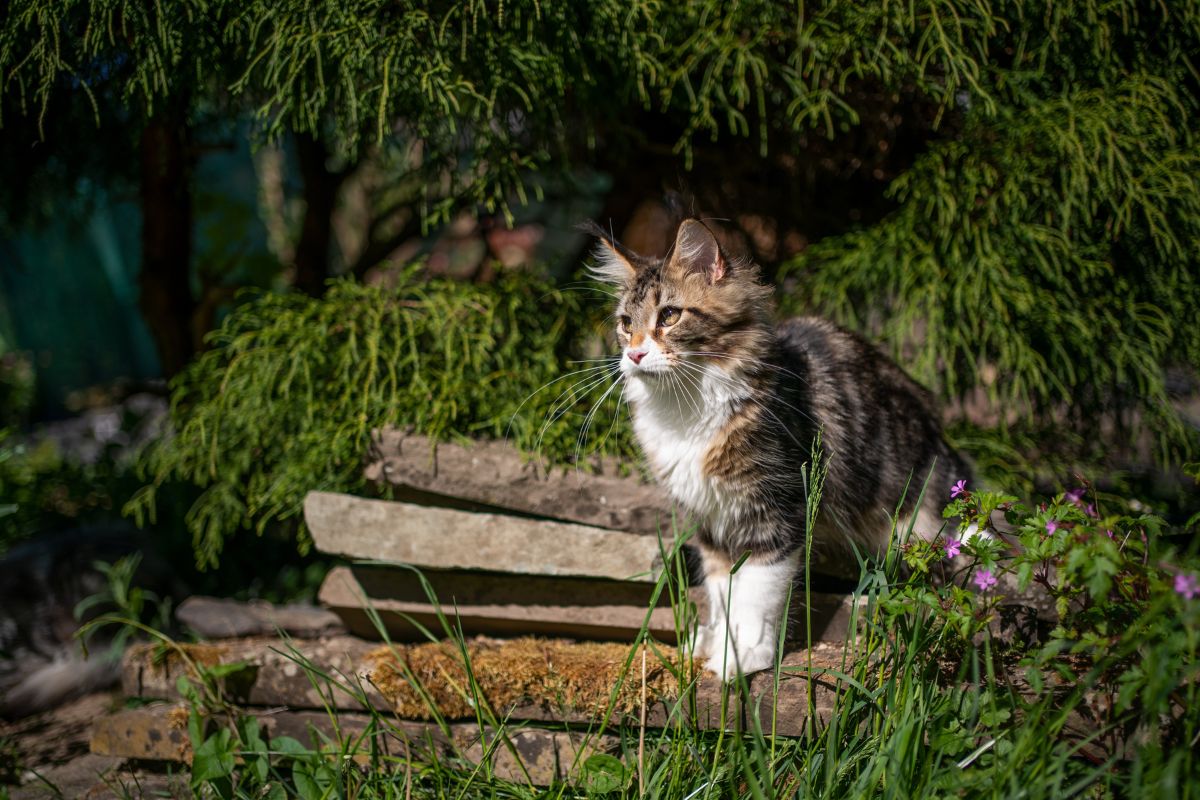
Currently, there is no treatment for hypertrophic cardiomyopathy in cats. Changes to the size and also the framework of the heart muscular tissues are irreversible. The longer the disease is allowed to go untreated, the greater the risk that more serious interventions will be required.
In some cases where the heart problem is secondary to a treatable problem such as hyperthyroidism, then the signs might be relieved when the underlying condition is resolved.
Your veterinarian can prescribe medication that help reduce the risk of congestive heart failure in cats resulting from hypertrophic cardiomyopathy. In some cases, medication can help:
- Slow down heart rate
- Relax the heart muscle
- Decrease the workload of the heart
The medication creates these changes in the hearts behavior, allowing more time for the heart to drain and fill. This reducing the strain upon the heart and reducing the chance of further damage, in turn reducing the risk of heart failure
Owners of cats with HCM should monitor their feline friends for any changes in their condition, even if they seem minor at first glance. This includes learning how to monitor respiratory rates and other vital signs at home, which a veterinarian can help with.
It is also important to come in for an exam with any changes in your cat's health or behavior and keep up all recheck appointments for the best outcome.
Where heart failure does develop, drugs can help to manage the heart. Below are some examples of available treatments:
- Beta-blockers. Beta blockers, such as atenolol or propranolol, help to slow down the heart rate, reducing the oxygen demand on the heart.
- Diltiazem. Reduces heart rate and the strength of heart contractions. It reduces the demand of the heart for oxygen and may help the heart muscle to relax between contractions
- ACE-inhibitors. Blocks a hormone system stimulated in cats with heart disease. Their use may help in the management of heart failure and possibly also in earlier stages of heart disease.
However, the true performance of lots of drugs in dealing with heart disease in cats is unclear, and a lot more scientific trials are required. Different medicines likewise act in various ways, therefore may be suitable in different circumstances.
In general, diuretics are one of the most useful medications in managing indications of congestive heart failure. With early medical diagnosis of heart problem, treatment may assist to slow down or postpone its development and also aid to preserve a good quality of life.
Long Term Prognoses for Cats with Hypertrophic Cardiomyopathy
Though hypertrophic cardiomyopathy in cats is incurable, it is important to ensure that your Maine Coon is regularly seen by a vet to pick up any developing problems. It’s important to remember that hypertrophic cardiomyopathy can develop quickly, but remain undetected until the advanced stages.
The time between diagnosis and death, if not picked up early, can be a matter of weeks or months. Despite this, hypertrophic cardiomyopathy is not an automatic death sentence, many cats will live long happy lives with the proper treatment.
If you suspect that your cat might be at risk for, or suffering from, any heart condition, please contact your vet to schedule an appointment.
Source: College of Veterinary Medicine

